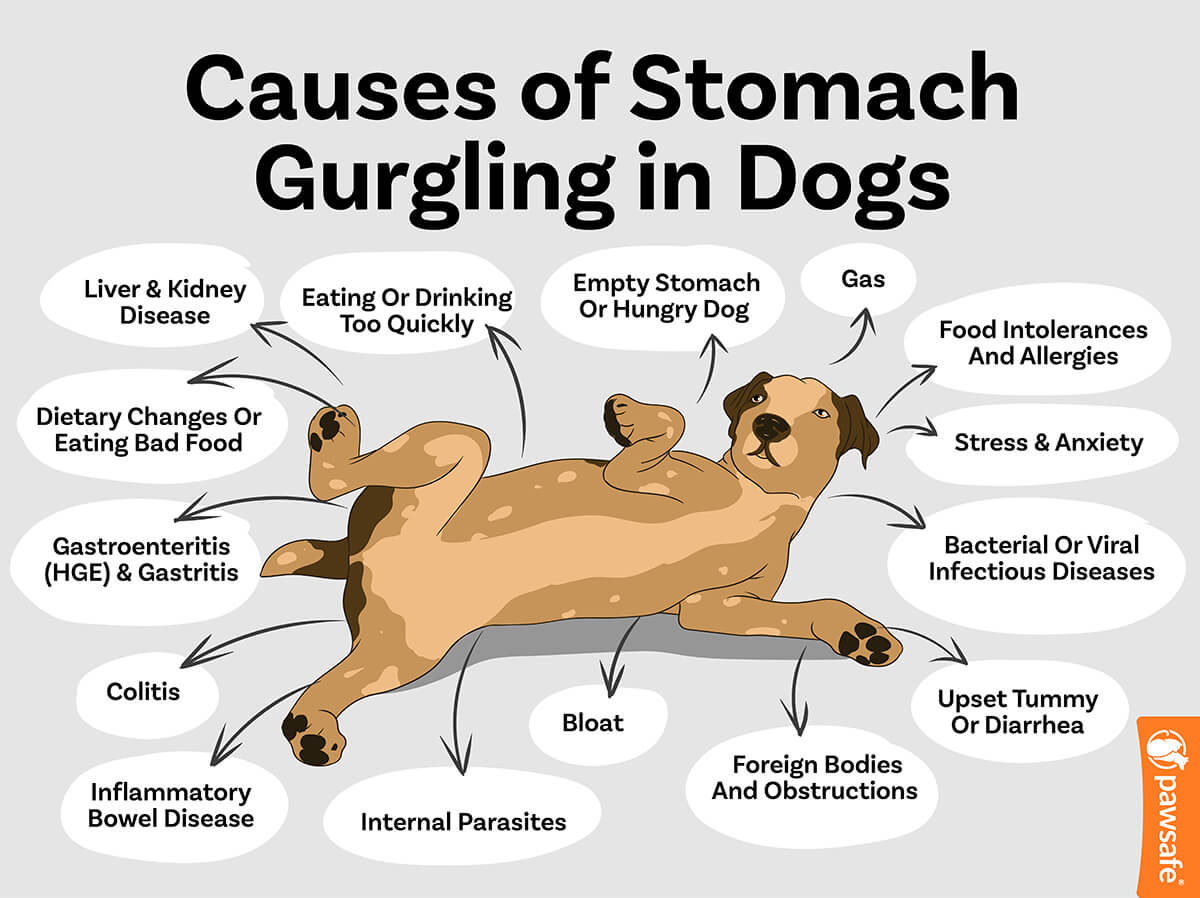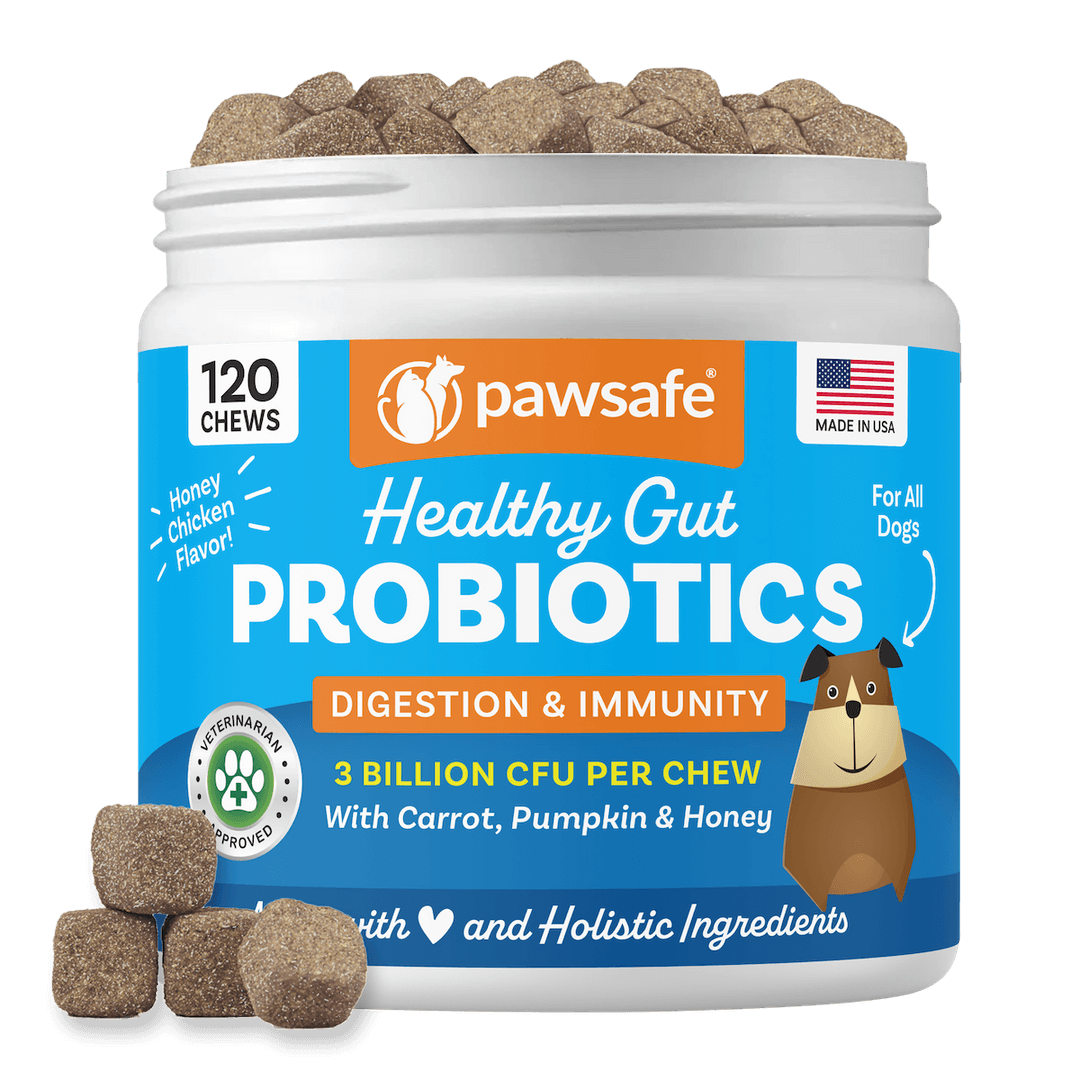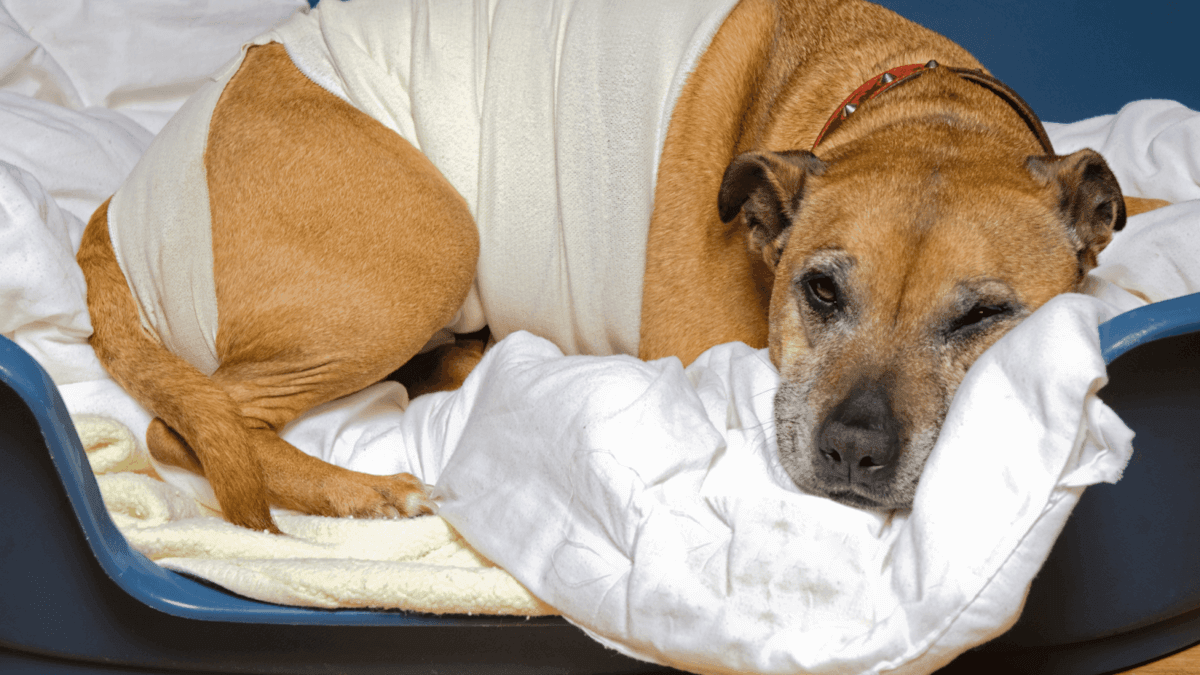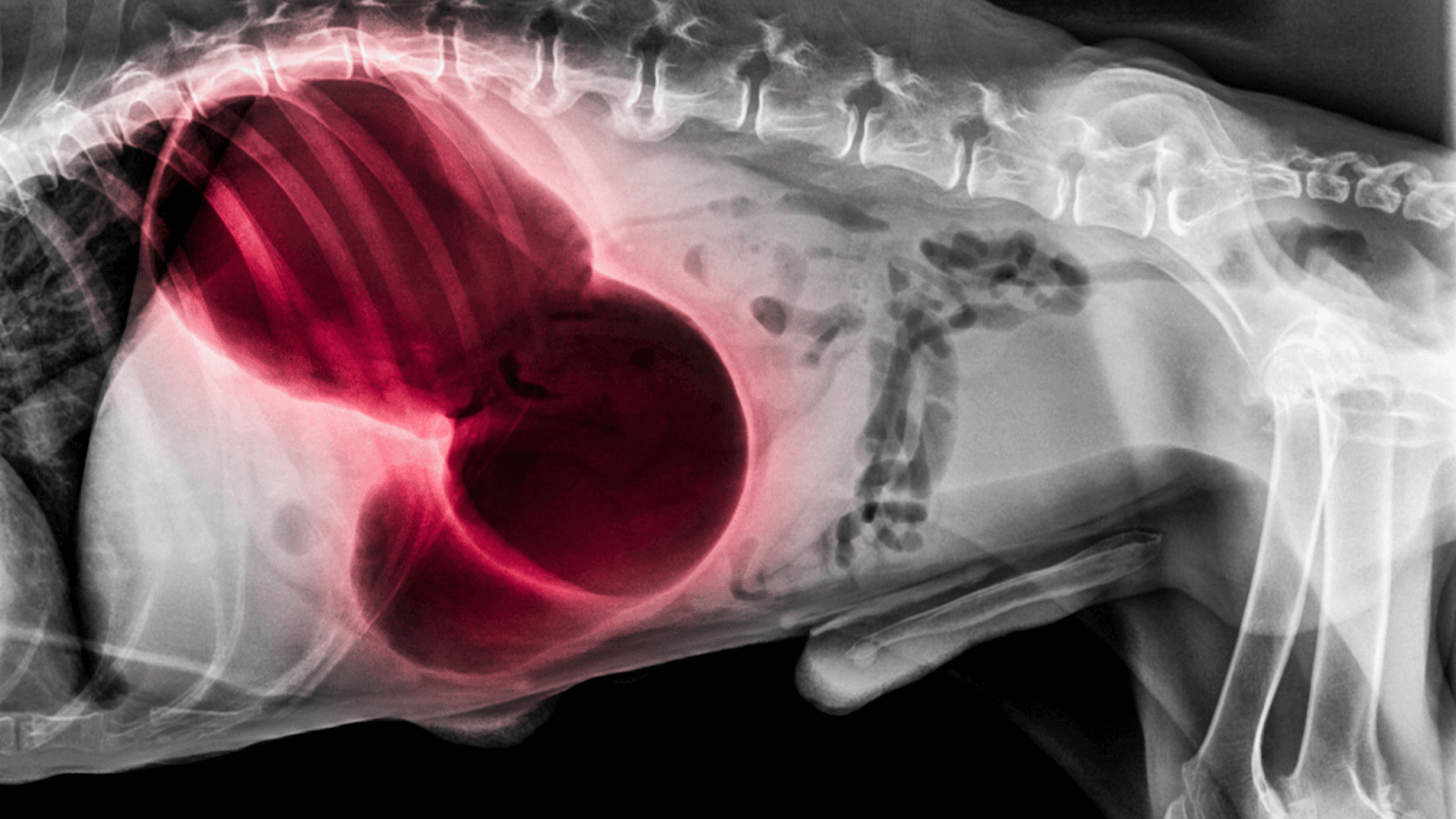
Dog Stomach gurgling is something many dog owners have experienced. The unsettling sound of their dog’s stomach gurgling can be loud and persistent, causing concern and worry.
Like dealing with gasses, canine probiotics will also help with stomach gurgling by improving the digestion of food in your dog’s stomach. If a dog has not eaten in several hours, their stomach may start to make noise as it prepares for food.
In this text, with the help of experts like Dr. Alice Defarges, DVM[1], in veterinary sources and manuals, we are going to scheme through various reasons why your dog’s stomach makes some funny yet scary noises. However, if a dog’s stomach is making noise even after they have eaten, it may be a sign of a more serious issue.
Table of Contents
- So, Why Is My Dog's Stomach Gurgling?
- Understanding Dog Stomach Gurgling or Borborygmus In Dogs
- Common Causes of Dog Stomach Gurgling
- Symptoms Accompanying Stomach Gurgling
- When to Seek Veterinary Help About Your Dog's Stomach Gurgling
- Preventing Stomach Gurgling in Dogs
- Treatment Options for Dog Stomach Gurgling
- Frequently Asked Questions (FAQs)
- Final Thoughts
- References
So, Why Is My Dog’s Stomach Gurgling?
Dog stomach gurgling simply means the tummy makes unusual noises. There are various reasons why your dog’s stomach may be gurgling, like hunger, stomach upset, gas, bowel obstruction, bloat, poor quality food, and parasites or infections. While it may be a cause for concern, it is often a normal bodily function.
A dog’s stomach may gurgle if they are hungry. Dogs who are fed on a schedule may have their stomachs gurgle when it’s close to mealtime. Feeding your dog small, frequent meals throughout the day may help prevent this.
A gurgling stomach can also be a sign of digestive issues. Dogs who eat too fast or consume an excessive amount of food may experience gurgling stomachs and even burping. Additionally, feeding your dog poor-quality foods may result in stomach upset and gas, resulting in stomach gurgling.
In conclusion, a dog’s stomach gurgling may be a normal bodily function or a sign of an underlying issue. If the gurgling is accompanied by other symptoms, such as vomiting or diarrhea, it is best to consult with a veterinarian to rule out any serious health issues.
Understanding Dog Stomach Gurgling or Borborygmus In Dogs

Borborygmus[2], also referred to as bowel sounds, is the scientific term for the rumbling or gurgling sounds that come from a dog’s stomach. It is a normal and common occurrence in dogs, but it can be concerning for novice pet owners.
The sound most likely to be heard across the room occurs when the intestines are contracted and relaxed as food and gasses are moving to the stomach.
There are several reasons why a dog’s stomach may make these sounds. One of the most common reasons is hunger. When a dog’s stomach is empty, the digestive system produces more gas and fluid, which can cause the stomach to make noises.
Dog stomach gurgling can be a sign of an underlying medical condition. For example, when a dog has eaten something difficult to digest, such as bones or foreign objects, it can cause choking or gurgling when trying to handle the discomfort. Another reason for stomach gurgling in dogs is the sudden food change, which may also result in diarrhea.
It is important for pet owners to pay attention to their dog’s stomach gurgling and to look out for any other symptoms that may indicate a medical problem. If a dog is experiencing frequent or severe stomach gurgling, vomiting, diarrhea, loss of appetite, or other unusual symptoms, it is essential to take them to a veterinarian for evaluation.
Common Causes of Dog Stomach Gurgling

Here are some common causes of dog stomach gurgling:
1. Eating Or Drinking Too Quickly
If a dog eats too quickly, it can cause the stomach to make noise as the food travels through the intestines to the stomach. Feeding a dog smaller, more frequent meals and using a slow feeder bowl can help prevent this from happening.
2. Empty Stomach or Hungry Dog
When a dog’s stomach is empty, the noises are caused by the movement of gas and fluids in the digestive system. The stomach and intestines are not completely empty and still contain digestive juices and gas. The noise results from the movement of these fluids and gas through the digestive system.
The noises may also be accompanied by other signs of hunger, such as licking their lips, pacing, or begging for food. Some dogs experience excessive hunger in dogs which can cause increased stomach gurgling.
It is crucial to note that stomach gurgling alone is not necessarily a sign of a health problem. However, if the noises are accompanied by other symptoms, such as vomiting, diarrhea, or loss of appetite, it may indicate an underlying health issue.
3. Gas
When a dog’s stomach is gurgling, it could be due to gas. Gas in the stomach can cause discomfort and sometimes pain, as well as those notorious dog farts[3]. It is common for dogs to experience gas, especially if they have eaten something that doesn’t agree with them.
Gas in the stomach can be caused by a variety of factors, including:
- Gulping[4];
- Eating foods that are difficult to digest;
- Food allergies or sensitivities; and
- Bacterial overgrowth[5] in the intestines.
If a dog is experiencing gas, it may also experience other symptoms, such as bloating, vomiting, diarrhea, or constipation. In some cases, gas can also be accompanied by bad breath. For dogs experiencing constipation along with stomach gurgling, there are constipation remedies that can help.
4. Food Intolerances and Allergies
Some dogs may experience stomach gurgling due to food intolerances or allergies. A food intolerance occurs when a dog’s digestive system cannot properly digest a particular type of food.
Food allergy occurs when a dog’s immune system overreacts to a certain protein in their food. Common food allergens for dogs include beef, chicken, dairy, and wheat. This can cause a range of symptoms, including stomach gurgling, as well as itching, skin rashes, and respiratory problems.
If a dog’s stomach gurgling is suspected to be caused by food intolerance[6] or allergy, it may involve a process of diet elimination. This is where certain foods are removed from the dog’s diet to see if symptoms improve.
5. Stress & Anxiety
Dogs, like humans, can experience stress, anxiety, and depression. This can lead to a variety of symptoms, including digestive issues that can include stomach gurgling. Stress and anxiety can be caused by a variety of factors, such as changes in routine, loud noises, separation from their owner, and more.
When a dog is stressed or anxious, their body produces more cortisol[7], the stress hormone. This can cause an increase in stomach acid production, leading to stomach gurgling. Additionally, stress and anxiety can cause a decrease in appetite, which can also contribute to stomach gurgling.
6. Bacterial Or Viral Infectious Diseases
Dogs can contract bacterial or viral infectious diseases that can cause stomach gurgling. These diseases can spread through exposure to infected feces and urine, contaminated food or water.
Some common bacterial infections that can cause stomach gurgling in dogs include:
- Salmonella;
- E. coli;
- Campylobacter; and
- Clostridium perfringens.
Viral infections that can cause stomach gurgling in dogs include:
- Canine distemper virus; and
- Canine parvovirus.
These bacterial and viral infections can cause symptoms such as diarrhea, vomiting, fever, dehydration, and stomach gurgling. If a dog is suspected of having a bacterial or viral infectious disease, it is crucial to seek veterinary care immediately.
Bacterial or viral infectious diseases can be prevented through proper hygiene practices such as regular hand washing, proper food handling and storage, and vaccination of dogs against common viral diseases. Treatment may include antibiotics[8], supportive care, and isolation to prevent the spread of the infection to other animals or humans.
7. Upset Tummy or Diarrhea
Dogs can experience an upset stomach or diarrhea for a variety of reasons. Some of the most common causes include:
- Eating something they shouldn’t have, such as spoiled food or trash;
- Consuming too much food or water too quickly;
- Stress or anxiety;
- Bacterial or viral infections;
- Parasites; and
- Food allergies or intolerances.
If a dog is experiencing an upset stomach or diarrhea, monitoring them closely and providing appropriate care is important. This may include:
- Withholding food for 12-24 hours to give the digestive system a chance to rest;
- Providing small amounts of water frequently to prevent dehydration; and
- Offering a bland diet such as boiled chicken and rice once the dog is ready to eat again.

Daily Support For Healthy Digestion
Multi-strain probiotic soft chews that help maintain gut balance and stool quality in an easy, tasty format.
Shop Now 👉Vet Approved Formula • 90-Day PawSafe® Promise
8. Foreign Bodies and Obstructions
Foreign bodies are objects that dogs swallow accidentally or intentionally. These objects may cause obstructions in the digestive system, leading to stomach gurgling. Examples of foreign bodies include toys, bones, and other household items.
9. Bloat (Gastric Dilation and Volvulus)
Bloat, also known as gastric dilation-volvulus (GDV), occurs when the stomach fills with gas and twists on itself, trapping the gas inside. This can cause a rapid increase in pressure within the stomach, leading to tissue damage and shock. Deep-chested breeds, such as Great Danes, Dobermans, and German Shepherds, are more prone to bloat.
Symptoms of bloat include:
- Distended abdomen;
- Restlessness;
- Repeated attempts to vomit, but little or nothing comes up;
- Rapid breathing; and
- Weakness or collapse.
Bloat prevention involves feeding multiple small meals throughout the day instead of one large meal, avoiding exercise immediately before or after meals, and reducing stress in the dog’s environment.
10. Internal Parasites
Several internal parasites can affect dogs, including roundworms, hookworms, heartworms, and whipworms. These parasites can be contracted by contacting contaminated soil or feces or ingesting infected prey.
Symptoms of internal parasites can vary depending on the type of parasite and the severity of the infection. Some common symptoms include:
- Diarrhea;
- Vomiting;
- Weight loss;
- Loss of appetite;
- Lethargy; and
- Anemia.
If you suspect your dog has internal parasites, you must take them to the vet for a diagnosis.
11. Inflammatory Bowel Disease
Inflammatory bowel disease (IBD)[9]+or+pallor+of) is a chronic condition that affects a dog’s digestive system. It is characterized by inflammation of the intestinal lining, which can lead to various symptoms, including chronic diarrhea, vomiting, and weight loss.
There are two primary forms of IBD in dogs: lymphocytic-plasmacytic enteritis (LPE)[10] and eosinophilic[11]+is+a+rare+inflammatory+disorder+characterized+by,heterogeneous+profile+of+physical+manifestations.) gastroenteritis (EGE). LPE is the most common form of IBD in dogs and is characterized by small intestine inflammation. Conversely, EGE is less common and is characterized by stomach and small intestine inflammation.
It is important to note that IBD is a chronic condition that cannot be cured. However, with proper management, most dogs with IBD can live happy and healthy lives. Regular check-ups with a veterinarian are essential to monitor the dog’s condition and adjust treatment as necessary.
12. Colitis
Colitis is a condition where the colon becomes inflamed, which can cause stomach gurgling in dogs. Various factors, including bacterial infections, parasites, food allergies, or stress, can cause inflammation.
Symptoms of colitis can include bloody diarrhea, pooping a lot, and abdominal pain. In some cases, blood may be present in the dog’s stool. Treatment for colitis typically involves a combination of medication and dietary changes.
13. Gastroenteritis (HGE) & Gastritis
Gastroenteritis (HGE) and gastritis[12] are two common causes of dog stomach gurgling. Gastroenteritis is a condition where the stomach and intestines become inflamed and irritated, leading to vomiting and diarrhea. HGE is a severe form of gastroenteritis that can cause bloody diarrhea, blood in vomit, and dehydration.
Gastritis, on the other hand, is inflammation of the stomach lining. Various factors, including stress, infections, and certain medications, can cause this. Symptoms of gastritis include vomiting, loss of appetite, and stomach pain.
14. Dietary Changes or Eating Bad Food
Dog stomach gurgling can also be caused by dietary changes or eating bad food. Dogs can be sensitive to changes in their diet, so it’s important to introduce new foods gradually. Abrupt changes in diet can cause digestive upset, including stomach gurgling.
15. Liver & Kidney Disease
The liver and kidneys are essential organs that contribute to food digestion and remove toxins from the body. When the liver is not functioning properly, it can lead to a variety of symptoms, including stomach gurgling, green poop, and vomiting.
Symptoms Accompanying Stomach Gurgling
Here are some common symptoms that may be present along with stomach gurgling:
1. Vomiting
Vomiting is a common symptom that may accompany stomach gurgling in dogs. It can occur due to a variety of reasons, including eating too fast, eating something that does not agree with the dog’s stomach, or due to an underlying medical condition.

Gut & Immune Support In One Chew
Targeted strains assist normal digestion while supporting natural immune defenses—simple once-a-day routine.
Shop Now 👉Vet Approved Formula • 90-Day PawSafe® Promise
2. Diarrhea
Diarrhea is another reason for stomach gurgling occurring due to a change in diet, eating something that does not agree with the dog’s stomach, or due to an underlying medical condition.
3. Loss of Appetite
Loss of appetite can occur due to illness, dental issues, and gastrointestinal issues, just to name a few, and is common in dogs with stomach gurgling.
4. Lethargy
Lethargy can occur due to age, toxic ingestion, poor diet, or chronic conditions.
When to Seek Veterinary Help About Your Dog’s Stomach Gurgling

If other symptoms accompany a dog’s stomach gurgling, it may indicate an underlying medical condition that requires veterinary attention. Delaying treatment could lead to the condition worsening and potentially becoming life-threatening.
Preventing Stomach Gurgling in Dogs
Proper Diet
A proper diet is essential to prevent stomach gurgling in dogs. Feeding a high-quality diet that is appropriate for the dog’s age, breed, and activity level can help prevent stomach gurgling. Dogs should also be fed at regular intervals to prevent overeating and indigestion.
Regular Exercise
Regular exercise is crucial to maintain a healthy digestive system in dogs. Exercise can help stimulate the digestive system and prevent constipation, which can lead to stomach gurgling.
Stress Management
Stress can cause stomach gurgling in dogs. Owners should provide their dogs with a stress-free environment to prevent stomach gurgling. Dogs should have a comfortable and quiet place to rest and sleep.
Treatment Options for Dog Stomach Gurgling

If your dog is experiencing stomach gurgling, several treatment options are available. The right treatment will depend on the underlying cause of the gurgling. Below are some of the most common treatment options.
Medication
If the stomach gurgling is caused by an underlying medical condition such as gastritis or inflammatory bowel disease, medication may be prescribed to help manage the symptoms. Common medications used for stomach gurgling in dogs include:
- Antacids: These medications help to neutralize stomach acid and reduce inflammation in the digestive tract.
- Probiotics are beneficial bacteria that can help restore the natural balance of bacteria in the gut.
- Anti-inflammatory drugs like Etodolac[13] can help reduce inflammation in the digestive tract and relieve pain.
It is important only to give your dog medication that a veterinarian has prescribed.

Make Digestive Care Effortless
Palatable soft chews your dog looks forward to, helping keep things regular and comfortable over time.
Shop Now 👉Vet Approved Formula • 90-Day PawSafe® Promise
Surgery
In some cases, surgery may be required to treat stomach gurgling. This is typically only necessary if the gurgling is caused by a more serious underlying condition, such as an intestinal obstruction or tumor.
Surgery may involve removing the obstruction or tumor or repairing any damage to the digestive tract.
Alternative Therapies
Several alternative therapies may help treat stomach gurgling in dogs. These include:
- Acupuncture: This ancient Chinese practice involves inserting thin needles into specific points on the body to promote healing.
- Herbal remedies: Certain herbs, such as ginger and chamomile, may help to soothe the digestive tract and reduce inflammation.
- Massage: Gentle massage of the abdomen can help to stimulate digestion and relieve gas.
It is essential to discuss any alternative therapies with a veterinarian before trying them on your dog.
Overall, the right treatment for your dog’s stomach gurgling will depend on the underlying cause. Working closely with a veterinarian is vital to determine the best course of action.
Frequently Asked Questions (FAQs)
What causes a dog’s stomach to gurgle?
A dog’s stomach can gurgle for various reasons, such as hunger, gas, or indigestion. Sometimes, it can also indicate an underlying medical condition such as inflammatory bowel disease or pancreatitis.
Is it normal for a dog’s stomach to gurgle?
It is common for a dog’s stomach to gurgle occasionally, especially if they are hungry or have eaten something that doesn’t agree with them. However, if the gurgling is persistent or accompanied by other symptoms, it may indicate an underlying issue.
When should I be concerned about my dog’s stomach gurgling?
If your dog’s stomach gurgling is accompanied by other symptoms such as vomiting, diarrhea, loss of appetite, or lethargy, it may be a cause for concern. Additionally, if the gurgling is persistent or seems to be worsening, it may be a sign of an underlying medical condition and should be evaluated by a veterinarian.
How can I help my dog’s gurgling stomach?
If your dog’s stomach gurgling is due to hunger, feeding them a small, bland meal may help alleviate the issue. However, if the gurgling is due to an underlying medical condition, treatment will depend on the specific condition and should be determined by a veterinarian.
Can a dog’s stomach gurgling be a sign of illness?
Yes, a dog’s stomach gurgling can indicate an underlying medical condition such as inflammatory bowel disease, pancreatitis, parvo or gastrointestinal obstruction and illnesses. If the gurgling is persistent or accompanied by other symptoms, it is vital to have your dog evaluated by a veterinarian.
What should I do if my dog’s stomach is gurgling and they are vomiting or have diarrhea?
If your dog’s stomach is gurgling and they are vomiting or have diarrhea, it may be a sign of a gastrointestinal issue that requires emergency medical attention. It is essential to withhold food and water for a few hours to allow their stomach to settle, and then offer small amounts of water and a bland diet. If the symptoms persist or worsen, seek veterinary care. If there is abdominal swelling or pain, see a vet immediately.
Final Thoughts
Dog stomach gurgling is a common and usually harmless occurrence. However, it can also be a sign of a more serious underlying condition, so monitoring your dog’s symptoms and behavior is important. If your dog’s stomach gurgling is accompanied by other symptoms such as vomiting, diarrhea, loss of appetite, or lethargy, it is recommended to seek veterinary attention.
References
- Alice Defarges. Uoguelph. https://ovc.uoguelph.ca/clinical-studies/faculty/Alice-Defarges
- Abnormal Gut Sounds - Common Clinical Presentations in Dogs and Cats. Wiley. https://onlinelibrary.wiley.com/doi/abs/10.1002/9781119414612.ch47
- dog farts. Amazonaws. http://assets.prod.vetlearn.com.s3.amazonaws.com/mmah/ec/c2d689a3b047d3bc83d69f06d329f3/filePV_23_12_1075.pdf
- A Comparative Assessment of the Diagnosis of Swallowing Impairment and Gastroesophageal Reflux in.... PMC. https://www.ncbi.nlm.nih.gov/pmc/articles/PMC9228035/
- Bacterial Overgrowth in Dogs—More Common Than You Think - WSAVA2002 - VIN. Vin. https://www.vin.com/apputil/content/defaultadv1.aspx?meta=&pId=11147&id=3846192
- Food intolerance in dogs and cats - Craig - 2019 - Journal of Small Animal Practice - Wiley Onlin.... Wiley. https://onlinelibrary.wiley.com/doi/abs/10.1111/jsap.12959#:~:text=Dietary+indiscretion+and+non-immunological,and+managing+adverse+food+reactions.
- Physiological stress reactivity and recovery related to behavioral traits in dogs (Canis familiar.... PMC. https://www.ncbi.nlm.nih.gov/pmc/articles/PMC6748563/
- Metronidazole. VCA Hospitals. https://vcahospitals.com/know-your-pet/metronidazole
- Inflammatory bowel disease in the dog: Differences and similarities with humans. PMC. https://www.ncbi.nlm.nih.gov/pmc/articles/PMC2835779/#:~:text=Clinical+manifestations+of+IBD+in,is+present
- Canine Lymphocytic-Plasmacytic Gastroenteritis. Purdue. https://www.addl.purdue.edu/newsletters/2007/Fall/clpg.html
- Eosinophilic gastroenteritis: Approach to diagnosis and management. PMC. https://www.ncbi.nlm.nih.gov/pmc/articles/PMC5095570/#:~:text=Eosinophilic+gastroenteritis+(EGE
- Gastritis in Small Animals - Digestive System. MSD Veterinary Manual. https://www.msdvetmanual.com/digestive-system/diseases-of-the-stomach-and-intestines-in-small-animals/gastritis-in-small-animals
- Page not found. ScienceDirect. https://www.sciencedirect.com/topics/veterinary-science-and-veterinary-medicine/etodola







